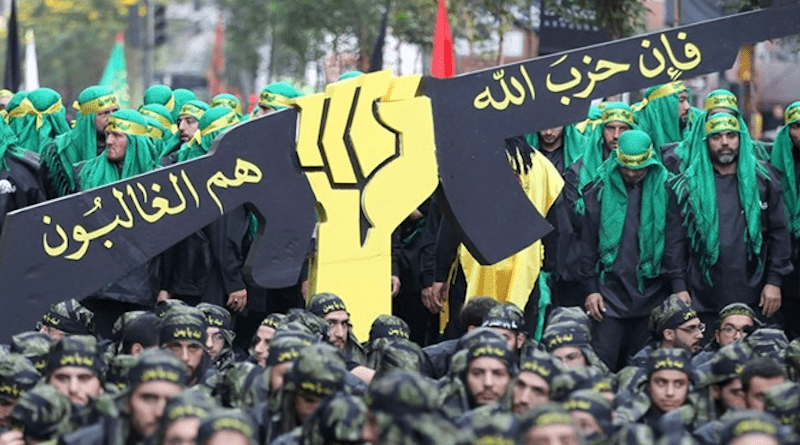Hezbollah Incites Lebanon Toward Armageddon – OpEd
By Arab News
By Baria Alamuddin
In belligerent, warmongering language, Hezbollah chief Hassan Nasrallah last week threatened to attack the Mediterranean island of Cyprus — a European nation — if it opened its military bases to Israel.
The EU leapt to Cyprus’ defense and warned that any threat to a member state was a threat against the whole bloc, while pro-Hezbollah media gloated that Nasrallah had provoked global panic about a regional war. Before his speech, Israel said operational plans for an offensive in Lebanon had been approved and Foreign Minister Israel Katz said an all-out war would lead to Hezbollah’s destruction.
Meanwhile, other reports quoted eyewitnesses as saying Hezbollah had been using Beirut airport to transport and store weapons. The airport was bombed in 2006 and, before the latest conflict, Israel had threatened to bomb it again if Hezbollah used it for arms smuggling. Many Lebanese panicked about being trapped in a war zone with no flights out, while airport staff voiced fears about Israeli airstrikes. The airport is in a densely populated part of the capital that includes Hezbollah strongholds, stoking fears that it would be on the front line of any conflict. There are rumors about Hezbollah weapons stockpiled elsewhere in the capital, including districts controlled by the militia’s Christian allies. This conjures up traumatic memories of the mass loss of life in the immensely destructive 2020 explosion at Beirut port, where Hezbollah had also been storing explosives.
Nasrallah’s message to the Lebanese people is: “We are taking you to war, but it’s all going to be fine” — which fails to acknowledge the barbaric consequences of any such war. He may be correct in boasting about the massive post-2006 increase in Hezbollah’s military capacities, but the balance of firepower is still disproportionately tilted toward Israel and its allies. As UN Secretary-General Antonio Guterres warned: “One rash move, one miscalculation, could trigger a catastrophe … the people of the region and the people of the world cannot afford Lebanon to become another Gaza.”
“Resistance” supporters have bought into this kamikaze rhetoric, but Lebanon — like Tehran’s other satellite states — is already a disintegrating, bankrupt nation in which people can barely survive. While many Lebanese would dearly love to give Israel a black eye, most are sufficiently grounded to realize where confronting the planet’s most powerful armies would take them — particularly after watching the genocide unfolding in Gaza. Everyone recalls what befell Lebanon in 2006. So, no one can claim to be unaware of the savage manner in which Israel wages war — always seeking to inflict collective, indiscriminate vengeance 50 times as destructive as the original provocation.
Hezbollah flaunted surveillance drone footage of sensitive military sites and population centers and Nasrallah said no place in Israel would be safe from its missiles. Israeli military chief Herzi Halevi retorted that Israel’s enemies knew little about its capabilities but would face them when the time was right.
After Nasrallah’s speech, militants in Iraq threatened renewed attacks against US targets. On a visit to Baghdad, Iranian Foreign Minister Ali Bagheri Kani discussed scenarios for an expanded war, after which Iraqi Foreign Minister Fuad Hussein warned that such a conflict would affect the entire region and not just Lebanon.
Iraqi factions such as Kata’ib Hezbollah and Harakat Hezbollah Al-Nujaba are said to have promised Kani that their “hands are on the trigger.” However, one Iraqi militant source remarked that Hezbollah would probably not welcome deployment of these forces “because they view them as unqualified, lacking in cohesion and, at best, bad allies with countless problems in decision-making.” Tehran also prefers distancing its Syrian and Iraqi factions from full-blown conflict to avoid disrupting its crucial transregional networks. In the words of one Iraqi official: “Iraq is the crown jewel of the Iranians, more than Hezbollah, and they will not risk it in the south Lebanon war.”
Equally, Tehran has sought to insulate itself from conflict because it has no intention of playing any role in reconstruction — just as it did nothing to rebuild Lebanon after the 2006 war, apart from rearming Hezbollah. It was Arab states that invested billions in rebuilding Lebanon at that time, but Beirut should expect no such recompense again.
This vicious circle of escalatory provocation and rhetoric through which both sides arouse grassroots supporters into a frenzy risks straitjacketing the region into Armageddon. About 160,000 people have already been displaced from north Israel and south Lebanon. The cumulative damage to Lebanon is equivalent to that of a full-scale war, with hundreds dead and damage to at least 15,000 homes. The use of phosphorus bombs in agricultural regions furthermore seeks to render land there permanently barren, calculatedly decimating livelihoods and the national economy.
All we request from Nasrallah and his ilk is that they start being honest with citizens: macho, warmongering rhetoric and gambling with Lebanese lives will reap only utter destruction, in a war Israel and Hezbollah are jointly complicit in inciting.
Despite what Nasrallah claims, Palestinians themselves do not desire to see Lebanon suicidally ravaged as part of some futile gesture of support. Even Hezbollah’s supporters fear such an outcome for their nation, which can bear no more self-inflicted harm.
Lebanon was, until recently, the region’s capital of commerce, culture and intellectual endeavor: let’s not see it annihilated on a whim. It is high time that Hezbollah started prioritizing its loyalty to Lebanon, not to a far-off theocratic regime that harbors hostile intentions for the entire region.
- Baria Alamuddin is an award-winning journalist and broadcaster in the Middle East and the UK. She is editor of the Media Services Syndicate and has interviewed numerous heads of state.

